Plender Read online
PLENDER
Ted Lewis
SYNDICATE BOOKS
NEW YORK
Copyright
First published in Great Britain by Michael Joseph Ltd in 1971
This edition published in 2015 by Syndicate Books
www.syndicatebooks.com
© 1971 by Ted Lewis
© 1994 The Estate of Edward Lewis
eISBN 9780984212545
Other Books by Ted Lewis
The Jack Carter Trilogy
Get Carter
Jack Carter’s Law
Jack Carter and the Mafia Pigeon
Crime Novels
Plender
Billy Rags
Boldt
GBH
Other Novels
All the Way Home and All the Night Through
The Rabbit
About the Author
Born in Manchester, England, Ted Lewis (1940-1982) spent most of his youth in Barton-upon-Humber in the north of England. After graduating from Hull Art School, Lewis moved to London and first worked in advertising before becoming an animation specialist, working on the Beatles’ Yellow Submarine. His novels are the product of his lifelong fascination with the criminal lifestyle of London’s Soho district and the down-and-out lifestyle of the English factory town. Lewis’s novels pioneered the British noir school. He authored nine novels, the second of which was famously adapted in 1971 as the now iconic Get Carter, which stars Michael Caine.
Author’s note
This novel and its central character were originally inspired by certain actual events and by a real person. But it is a work of fiction: all the descriptions of prisons, convicts and their friends and relatives, prison officers and policemen are imaginary.
Dear Sheila
With any luck Ronnie should get this to you by Thursday. It had to come pigeon post on account of what I’ve got to say, as you’ll appreciate. When you’ve read it, get rid sharp. What we are talking about is on, most likely sometime over the weekend, but maybe Monday or Tuesday. Whenever it is, though, I’ll be with you next week, darling. For Christ’s sake keep everybody else out of it. Only Ronnie knows and don’t talk to him about it either, because you’re not supposed to know and he might cop out, you never know. So just wait for the phone call, that’s all you can do. I know you’re feeling the same way as I am but it won’t be long now.
See you soon
All my love
Billy
PLENDER
PLENDER
The double-glazing shuddered.
A grey wet wind screamed up the estuary and into the city centre, rocked trolley buses and swept old cabbage leaves along the cobbled docksides. Dirty barges shifted surlily on the greasy swell. Windows of workmen’s cafés were blank with inside steam. Raindrops flicked spitefully into the faces of the Saturday afternoon shoppers. Icy neon exaggerated the chilly faces of the shuffling crowds in the teatime indigo.
But where I was, behind the double-glazing, twelve storeys up, it was warm and cozy and nice. I stood in front of the plate glass and looked down at the crowds and thought how nice it was to be twelve storeys up, in the warm, out of the wet.
I turned away from the window and walked over to my beautifully plain, beautifully Swedish desk and took a cigarette out of the rosewood box and lit it with the table lighter. I smiled as I clicked the mechanism; the trick was that down one side it was wooden, carved in the shape of a woman, except for the tits, they were in silver and you pressed them to operate the lighter and the flame would spurt out from between the figure’s legs. I smiled out of habit, the habit of smiling along with people who reacted to the gadget for the first time.
I put the lighter back and sat down behind my desk and carried on staring out of the big window. Speckled with rain the window twinkled darkly with the city’s afternoon lights and the wet warped images of cranes flowed down the glass. Beyond the cranes I could see the broad river the colour of stone and across on the other rural bank three miles away, sparse lights winked fitfully, delineating the flatness of the neighbouring county. Through the blue gloom I could just make out the faint lights of the opposite pier; and at the end of the pier a concentrated cluster of lights that began to move very slowly out into the river. I stared at the moving lights as they grew in size, as the ferry got closer to the northern bank. Any moment, I thought, he’ll ring. He always does. Too soon, every time.
Rain rattled and wind gusted and the phone rang. I let it ring twelve times before I picked up the receiver.
“Plender speaking,” I said.
“Is she there yet?” said the voice at the other end.
“Not yet, Mr. Froy,” I said. “The ferry’ll be docking in about ten minutes and then it’ll take them—”
“Yes, yes, all right. How did it go at the other end?”
“Fine.”
“No press?”
“No press.”
“How did she behave?”
“I’ll put it in my report. But you needn’t worry. It was in our favour that she was in love with the sherbert. She won’t say a dicky bird.”
“Let us hope not.” Froy’s cold fishy voice seemed to recede down the phone. “Phone me the minute they arrive.”
“Yes, Mr. Froy,” I said.
The line went dead. I put the phone back on its cradle. You old fart, Froy. You terrible old fart. You think you can trust me. If you only knew.
I looked at my watch. There was plenty of time yet. So I opened a drawer in my desk and took out a large stiff backed notebook. I flipped through the pages of names and numbers. Some of the names had ticks by them, some of them were underlined in red. I ran my finger down a column of names until I came to one which was underlined in red. Then I reached for the phone and dialed the number that went with the name and waited until the receiver was lifted at the other end.
“Hopper speaking,” a voice said—a voice short, sharp, and to the point.
“It’s Saturday,” I said.
The voice at the other end altered its tone.
“You said you wouldn’t call me here. You promised.”
“We did say Friday, and then when I didn’t hear from you, well, I thought, what’s a day. I can wait a day, but then . . .”
“It’s been difficult. I can’t explain now. But I can let you have it on Monday.”
“I’m sorry,” I said. “I’m afraid that won’t do. I’d like it tomorrow. Tomorrow morning.”
“That’s out of the question. I’ve . . .”
I sighed. It was quite incredible how exactly alike they all sounded. I said: “The usual place, Mr. Hopper. Between ten and five past.”
There was a silence, then a sound that told me he’d be there. Then the line went dead.
I dialed another number. The receiver was lifted.
“Yes?”
“Plender here.”
“Mr. Plender. What a time to ring. I was just watching me rugby.”
“Never mind that.”
“Never mind that, he says. Gawd, a girl’s got to have some little pleasures in life!”
“I need you tonight.”
“What for?”
“Don’t come that. You know what for.”
“Yes, but what for?”
“A new one. I’m meeting him at nine in Peggy’s Bar.”
“So?”
“So I’ll be introducing him to you, won’t I.”
“Oh, no. No. Not tonight you won’t. I’ve got this date.”
“That’s right. In Peggy’s Bar. About nine thirty.”
“No
w look. I’m telling you—”
“Don’t be silly, Derek, eh ? It just gets a little bit tedious, you know?”
“Camille, Mr. Plender. Please. It’s Camille.”
“All right, all right. So you’ve got the time?”
“Yes.”
“And the place?”
“Where else?”
“Good.”
“It’s just that I don’t like being called . . . the other.”
“Gurney’ll be round your place at eight to set the gear up. Right?”
“Gurney! That pig!”
“And you’d better not get saucy with him, either. I’d get him to break your back for you. Tonight, at any rate.”
“You’re horrible.”
“And no drag.”
“We’re going to Peggy’s, aren’t we?”
“No drag.”
“Not even when we get home?”
“That’s for you to decide. Personally, I think he’s relatively straight. By your standards, that is.”
I put the phone down before I could hear his inevitable whining. I pulled a face. They made me want to vomit, those.
The yellow light on my desk began to flash on and off. I pressed a button and the flashing stopped. A minute or so later another light flashed on and off above the door opposite my desk. I pressed another button. The door opened. A man and a girl came into the room.
“Hello, Colin,” I said. “How was the journey?”
“The journey was fine, Mr. Plender. We got snarled up just below Doncaster but apart from that it was fine.”
Colin Gurney was six feet three inches tall and thirty-four years old. He was going thin on top and the sheepskin and the twills he was wearing had seen better days but his public school manner was in just as good nick as ever. Nothing would ever fade that and he knew it. He also knew how I felt about him but he had to put up with that. And he knew I enjoyed his putting up with it. I relaxed in my chair. I enjoyed playing out this kind of scene: the indulgent employer, patting the head of the faithful servant in acknowledgement of a job well done. Expansively patronising. Gurney hated it because in his book, it was all the wrong way round. Well, he was right. And that made it all the sweeter.
“Good,” I said. “I’m glad the journey was fine.”
I looked at the girl. She was dressed exactly the way a first year university student taking liberal studies should be dressed. Apart from that she wasn’t bad at all.
“Sit down, Miss Gorton,” I said.
The girl didn’t move. I ignored the gesture and lit a cigarette.
“Now then,” I said. “Let me tell you what will happen if you ever try and get in touch with Mr. Nboro again.” I looked into her face. “A file compiled by this office will be sent to the Police Drugs Squad. The file contains tapes and photographs made during the course of a party given by Mr. Nboro for students and staff of the university. Mr. Nboro is heavily featured. Smoking, offering, and talking about pot. Plus airing certain views about student revolution and student participation in the university’s administration that would, to say the least, rather unsettle his superiors, not to mention a few of our more crusading national dailies. And it’s no good warning him so that he’ll keep himself clean just in case I send the lads the file; they’d hate to balls up a chance like this. They wouldn’t go empty handed. If you understand me.”
Gurney smiled.
“So there it is. You write to him, phone him, send a go-between, that’s it. The file goes and if you think you could get in touch with him without us knowing, ask yourself a question. How did we get the tapes and the pictures?”
The girl just stayed stock still, where she was, just looking at me. I leant back in my chair.
“He might get away with a fine,” I said, “but then he’s not Mick Jagger. He’s a Black Power militant in charge of a load of kids. The main thing would be that his career would be busted. And that would damage his ability to function usefully for his party. Which is his principal concern. Above anything else.”
Even that didn’t get a reaction.
“Does Nboro know what’s happened?” I asked Gurney.
“No, he doesn’t know, Mr. Plender,” said Gurney, careful to let the irony drip through the surface of necessary politeness. “I was particularly careful to observe your instructions in that regard.”
“As I hope you were in every regard,” I said.
Gurney reddened slightly.
“Yes, Mr. Plender.”
“Did she write the letter herself?”
“Yes.”
“Exactly as instructed?”
“Yes.”
I looked at the girl again.
“So that’s that,” I said. “Now it’s home to Daddy.”
“You bastards,” said the girl. “You bloody, bloody bastards.”
Her voice carried the soft accents of school fees but they hadn’t been heavy enough. The Yorkshire was still in her voice. She wasn’t the real thing, not like Gurney.
“Don’t blame us, blame Daddy,” I said. “We’re just businessmen. You’re just cargo to us.”
Very quickly the girl stretched forward and scrabbled the table-lighter off the top of my desk and threw it at me. It hit me on the edge of my jawbone, just below my ear. I didn’t move. I just sat there and gritted my teeth and felt the aching pain flow into my face and continued to stare at the girl who had been prevented from flying at me by Gurney. At first she tried to struggle against Gurney but Gurney had gripped her by the muscles in her upper arm and the numb pain very quickly became too much for her.
Eventually she burst into tears.
I got up and walked round the desk and stood in front of her. I lifted her chin with my forefinger and looked into her eyes. Little grammar school girl, I thought. Daddy’s little grammar school girl. Never had to worry about anything. Gets her O levels and her A levels with no trouble because she hasn’t the imagination to do otherwise. Then she falls in love with her second Black Beauty and bingo! Suddenly she’s committed. The first stiff prick that comes along and she not only screws it, she votes for it. She made me sick, this daddy’s little whore. But I had to leave it at that. There were bigger things at stake. Perhaps I’d have the pleasure later, when her old man was no longer of any political value to Froy and his mob.
“Lucky girl,” I said. “Lucky little girl.”
I sank back on to the edge of my desk. Gurney released his grip on her arms.
“Take her home to Daddy,” I said to Gurney.
“Yes, Mr. Plender.”
“And Gurney.”
“Yes, Mr. Plender?”
“That shirt. Is it clean on today?”
That threw him. He even had to clear his throat.
“No, Mr. Plender. You see—”
“It’s all right,” I said. “Don’t explain.”
Gurney and the girl stood frozen in the middle of the room like two people playing statues while I walked round the back of my desk and sat down again. I looked at them both. Then Gurney jerked back to life and opened the door and ushered the girl out.
“I want you back here in an hour,” I said to Gurney just as he was going through the door. “Something else has come up.”
Gurney managed to nod and then the door closed behind him. I put my hand to the telephone receiver and squeezed it, hard. With my other hand I stroked my cheek. Bloody bitch. Bloody clever little whore. If it wasn’t for daddy’s shady money she’d be behind the counter at Littlewood’s instead of pissing her time away at university. I expect she thought we fancied her, Gurney and me. (Why should we? Only daddy’s money makes her any different from the rest. And that isn’t a big enough difference.) Still, it’s back to reality now. Daddy’s money turns out to be double-edged. She won’t be straying too far from home for a while.
I p
icked up the phone and dialed. The receiver at the other end was lifted almost at once.
“Yes?” said Froy.
“She’s on her way home now,” I said.
“Have you seen her?”
Jesus Christ.
“Yes, I’ve seen her.”
“And?”
“Everything perfect. No problems.”
“The press?”
“I told you.”
There was a slight pause.
“Good. I’ll be in touch.”
“Mr. Froy?”
“Yes?”
“I was right.”
“Right? About what?”
“He is a power militant. One we didn’t have on file. Gurney sniffed it.”
“Interesting,” said Froy. “At that level, I mean.”
“There’s not much of it, but most of what there is we have. Except for the occasional surprise. I’ll send you the breakdown we did if you like.”
“Yes, I’d like to read it, but don’t send it. I’ll pick it up when next I see you.”
“Actually, it’s a bit of a pity really. If she hadn’t been Gorton’s daughter, I mean. We could have used the situation to benefit the Movement far better.”
“I realise that.”
“I mean, it was tailor made. If she’d been somebody else’s brat, one of our titled opponents, say, we could have tipped the Drugs Squad and made sure the Power stuff came out as well. A nice bit of negative P.R.: PEER’S DAUGHTER IN DRUGS SWOOP ON BLACK POWER PARTY; AFRICAN LECTURER CHARGED. And etcerera and etcetera.”
“No situation ever remains constant. If Gorton were ever to slip, we might reconsider what we have along the lines you mention.”
“I can’t see that happening,” I said. “Gorton’s a dedicated man. There are no blemishes on his record as far as the press are concerned.”
“And you should know,” said Froy.
Now what did that mean? I let it pass.
“Still,” I said, “the by-election should run smoothly enough now. Thanks to us there’s still flesh on the skeleton in Gorton’s cupboard.”

 All the Way Home and All the Night Through
All the Way Home and All the Night Through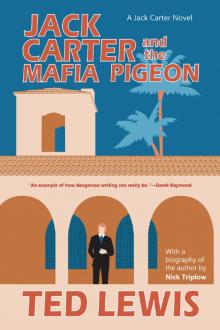 Jack Carter and the Mafia Pigeon
Jack Carter and the Mafia Pigeon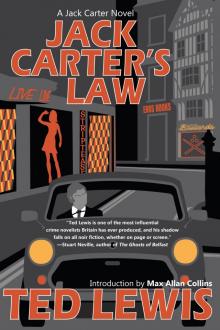 Jack Carter's Law
Jack Carter's Law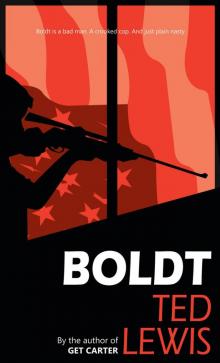 Boldt
Boldt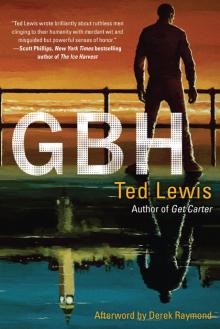 GBH
GBH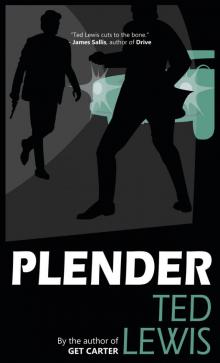 Plender
Plender The Rabbit
The Rabbit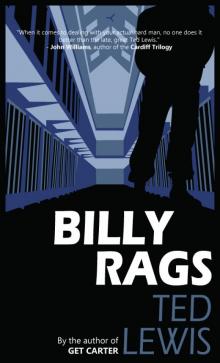 Billy Rags
Billy Rags